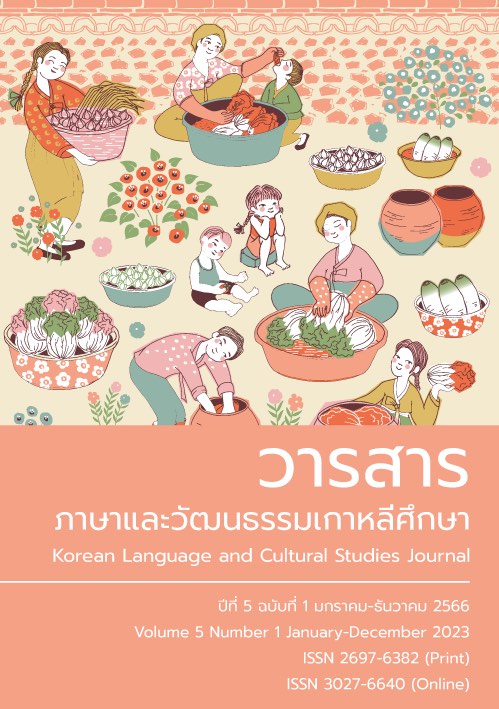A Study of Korean terms of address choice in response to speaker’s attitude in the discourse context
Main Article Content
Abstract
This research investigates how Korean terms of address are varied according to the speaker's attitude in the same speaker/listener relationship by comparing the honorific choices of Korean mother-tongue speakers and Thai Korean language learners. The term of address is one of the most challenging areas for foreigners in learning Korean language because they are presupposed to understand the sociocultural context of a language. The term of address is an essential mechanism for identifying the relationship between speakers and listeners. However, between the same speakers and listeners, the terms of address might be varied depending on the context. Until now, there has been a need for further research in Korean language education which examines the changes of terms of address due to the changes in speakers' attitudes in such discursive contexts. Therefore, this study aims to investigate how the choice of terms of address are varied according to the speaker's attitude by focusing on Korean mother-tongue speakers and Thai Korean language learners. For this purpose, 30 undergraduate and graduate students in the Republic of Korea and 30 undergraduate students who are studying Korean language in Thailand are surveyed. To determine how these target groups address names in 'neutral', 'friendly', and 'unfriendly' situations. This research also aims to find out what names Thai students employ in Thai language in the same situations so that we could examine the choice of names from a cross-cultural perspective. The study reveals that Korean mother tongue speakers’ choice of terms of address are varied widely in response to the changes of the speaker's attitude. Thai Korean language learners are different from Korean mother tongue speakers in their choice of titles, indicating that their native mother language influenced them.
Article Details
References
강영. (2006). 외국인을 위한 한국어 호칭어 교육. 비교한국학, 14(2), 31-58.
김은경. (2017). 한국어 호칭어 교육 방안 연구. 동신대학교 대학원 박사학위논문.
김미경 외. (2019). 대학생 간 호칭어 사용 양상에 대한 사회언어학적 변이 연구: 2000년대 이후 학번을 대상으로, 반교어문연구, 52, 119-166.
김유나. (2002). 한국어 학습자의 호칭어 사용 경험을 활용한 호칭어 교육 연구. 선청어문, 50, 131-161.
김홍매, 김광수. (2022). 사회언어학적 관점에서 본 한국어 교재의 호칭어 사용 실태 -본문 대화문을 중심으로-. 현대 사회와 다문화, 12(1), 143-167.
박미숙, 오영훈. (2015). 외국인 유학생이 인식하는 한국어 호칭과 문화와의 상관성 연구. 문화교류와 다문화교육, 4(2), 75-91.
박정운. (1997). 한국어 호칭어 체계. 사회언어학, 5(2), 507-527.
서진숙, 장미라, 박성진. (2019). 한국어 호칭어에 대한 한국 대학생, 중국 유학생의 인식 연구.학습자중심 교과교육연구,19(6), 473-503.
손춘섭. (2010). 현대국어 호칭어의 유형과 특성에 대한 연구. 한국어의미학, 33, 95-129.
왕한석 외. (2005). 한국 사회와 호칭어, 서울: 역락.
유민애, 박형진. (2022). 한국어 교재의 호칭어 교육 내용에 대한 고찰-한국인 모어 화자와 외국인 한국어 학습자의 실제 사용 양상을 중심으로-. 언어와 문화, 18(4), 113-142.
윤미선. (2021). 한국 영화 영어 더빙본의 호칭어 번역 연구. 국제어문, 91, 7-28.
윤희원. (2021). 한국어 학습자를 위한 호칭어 교육 방안 연구 : 한국어 모어 화자와의 비교를 중심으로. 한국외국어대학교 석사학위논문.
이익섭. (1994). 사회언어학. 서울: 민음사.
카위타 아난납. (2016). 한국어와 태국어의 사회 호칭어 비교 연구. 전주대학교 대학원 석사학위논문.
홍다은. (2017). 중국인 한국어 학습자의 한국 문화 경험에 따른 호칭어•지칭어 사용 양상 연구. 이화여자대학교 국제대학원 석사학위논문.
Pawana Petprai. (2012). 태국인 학습자를 위한 한국어 호칭어 교육 연구: 한•태 호칭어 비교 분석과 말하기 교육 방안을 중심으로. 한성대학교 대학원 석사학위논문.
Prasook, Pacharaporn. (2019). 한국어와 태국어의 호칭어 비교 연구. 목원대학교 대학원 석사학위논문.


